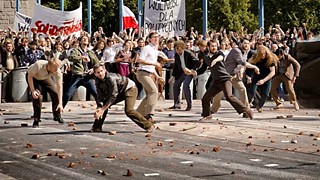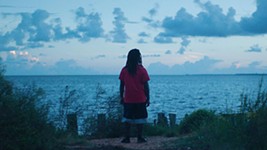No Hollywood Fluff, Please – We're Polish
Cinema tackles the Polish experience past and present at APFF
By Anne S. Lewis, Fri., Nov. 2, 2012
Let us now praise Polish film. Or, let me. Having just watched the last screener for the seventh annual Austin Polish Film Festival (my second festival preview on these pages), I'm a fan; I now actually troll Netflix for Polskie films – in between festivals. Until last year, Polish film, for me, meant mostly the usual suspects – Polanski, Holland, Kieslowski, Wajda. I knew little of the internationally esteemed Lódz Film School (much less that it was pronounced "Wooch") or its famous alums, not to mention the venerable Polish poster art tradition, a delightful sidebar to the APFF. Aside from certain red-letter markers, the fine points of Poland's tortured past and fluctuating borders – including two world wars, the Holocaust, and the Communist era – were, for me, a bit murky. Having watched the films that the APFF posse culls every year from Poland's Gdynia Film Festival, I'm more conversant with both Eastern European history and the 'geist of today's Poland. Production values are uniformly exceptional, as is the acting. The characters, across genres, tend to be multidimensional, often morally complex, or burdened with a palpable existential unease – the predictable fallout from life choices made in a shifting, ambiguous political landscape.
This year's program features films by younger directors, most born after 1950, says festival co-chair Mary Gawron. There will be nine features and three documentaries, including Beats of Freedom (directed by Leszek Gnoinski and Wojciech Slota), about the role of rock music during the Communist era. The poster exhibit is direct from Poland's Szczecin Academy of Art.
Not surprisingly, there's a strong historical component to many Polish films. A good example can be found in 80 Million (D: Waldemar Krzystek), Poland's 2013 entry for Best Foreign Language Film. It's set in Wroclaw during the infamous Communist-era Solidarity showdown of the early Eighties, when the labor union won, if only briefly, government recognition, before everything fell apart and martial law was imposed. 80 Million is an action film revolving around Solidarity's attempt to withdraw 80 million zlotys from its own account before the authorities could seize or freeze it. The Polish press compared the film to Ocean's Eleven, says Gil Rappaport, the University of Texas Slavic Languages prof who will introduce the film at the festival: "A normal transaction – a legal organization withdrawing its own money from a bank account, right? The underlying irony of the film is that nothing was normal in Communist Poland."
Despite some undeniably Hollywood elements – Rappaport notes that "every character is either a 'good guy' or a 'bad guy'" – the film also has its share of "typical Polish elements." In a country whose history includes "extensive periods of occupation or control by foreign authoritarian regimes," he says, there are two distinctly Polish sets of problems that, as is true of 80 Million, often find their way, thematically, into the country's cinema: "One is the issue of collaboration versus resistance. It is easy to see a morality play unfolding in many episodes of Polish history, especially in the Solidarity saga, and yet there were substantial elements of Polish society who succumbed to the blandishments, including simple job security, of collaborating with or working directly for the Security Service.
"The second very Polish element is the moral and personal dilemma of whether to rebel at all or not. Polish history has been filled with unsuccessful uprisings and sacrifices, and it is even a cultural meme, if you will, about the romantic Polish hero making the grand gesture of struggle and sacrifice, to no avail, versus working within the system to improve it."
Other Highlights From This Year's Program:
Róza (D: Wojciech Smarzowski): Another film with a historical setting, Róza takes place amidst the unspeakable postwar brutality and devastation in the district of Masuria, an ethnically German area located along the former Polish-Prussian border. When Masuria was handed over to Poland in 1945, those with German roots left for Germany; those who stayed had to learn Polish and figure out how to get along with the new Polish settlers. Gawron says of this film, "For decades the true story of what was happening to countries and 'non'-countries (between the Baltic and Black Seas) and the people who were murdered, raped, starved, and sacrificed with no ready witnesses or eager defenders was invisible. This is in large part due to the complete Nazi and Soviet censorship and disinformation, but the American and British allies also cooperated and censored or ignored intelligence information. With no restrictions, millions of civilians were subjected to crimes against humanity – with very few perpetrators brought to justice. Polish people (and Estonians, Lithuanians, Ukrainians, Russians, etc.) – starved for the true story, growing up under Communism – are now voraciously consuming the truth, whether through film or print – and [Róza] is one example of this. Interestingly enough the director emphasizes that this is a 'love story': 'About love on the ruins. Love in an inhuman era.'"
Women's Day (D: Maria Sadowska): A Dickensian be-careful-what-you-wish-for drama. Or, Norma Rae meets Erin Brockovich. Single mom Halina, a downtrodden supermarket cashier, gets promoted to store manager. But things quickly go south as Halina discovers the soul-crushing trade-offs that are part of her new job description. In the end, she decides to fight back. Says Sadowska of her film, "The Polish reality, with its rampant capitalism and consumerism, is alarmingly absurd. And it is this absurdity of the situation that I wish to display in my film. ... There's a lack of interesting female characters in Polish cinema. In a sense, this entire tale is based on Halina's awakening strength for the fight. ... [It's also] a story about people who are oppressed and unable to fight for what's theirs. They have this passivity inscribed somewhere within themselves, and they have to search for the internal strength to fight and for the road to freedom." (Sadowska and actor Katarzyna Kwiatkowska will be present at the screening.)
Wymyk (D: Grzegorz Zgli´nski): Wymyk is a story about two rivalrous adult brothers and a train incident. When a woman passenger is attacked by hoodlums, Jerzy jumps in the fray, while Alfred hangs back – even as his brother is severely beaten. Zglinski says he based this film on personal experience. "In Wymyk, cowardice takes a very dramatic form, but you can try to figure out why this happened, perhaps even sympathize. I do not excuse Alfred's actions, but whenever I think about it, I [try] to imagine which elements of Alfred's past contributed to his lack of response on the train."
My Name Is Ki (D: Leszek Dawid): Ki is a young, beautiful, financially struggling single mother who can't say no to the exciting life denied those saddled with the responsibilities of being someone's mom. At first we sympathize with Ki, but as her character develops, we see how she's responsible for her own plight.
Crulic: The Path to Beyond (D: Anca Damian): This creatively animated documentary tells the true story of Romanian native Claudiu Crulic, who, wrongfully arrested in Kraków for theft, dies in prison following a four-month hunger strike.
Suicide Room (D: Jan Komasa): A disturbingly universal slice of the life of disaffected youth. Mocked as gay at school, his disaffection overlooked by wealthy, self-involved, careerist parents, a spoiled teen finds high drama and succor in an online emo-culture community. His film, says Komasa, was inspired by Virginia Woolf's novel, Jacob's Room.
The Austin Polish Film Festival runs Nov. 1-4 at the Marchesa Hall and Theatre (6406 N. I-35 #3100, in Lincoln Village). See www.austinpolishfilm.com for schedule and ticket info.











